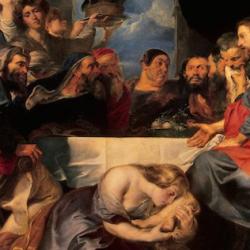This is repetitive, but here goes:
Luke?s account of Jesus?Ecrucifixion ends on a note of triumph. After Jesus breathes His last breath, the Roman centurion confesses that Jesus was ?righteous?Eand begins to praise God. The crowds of people who had come out for the spectacle go home beating their breasts in repentance. And suddenly a man emerges from the faceless mass of the Jewish Sanhedrin, is given a name, Joseph, and is ensuring that Jesus?Ebody is honorably buried. Jesus is no sooner dead than Gentiles and Jews are acknowledging Jesus as Savior.
Though not everyone changes their attitude toward Jesus, the shift is remarkable and profound. During Jesus?Ecrucifixion, the Jewish rulers, apparently operating as a homogenous unit, were mocking Jesus, and the Roman soldiers had done the same. Even one of the criminals dying with Jesus joined in on the fun, asking Jesus with thick sarcasm to save himself ?and us.?E In Luke, the story of the cross moves from mockery to praise, from scoffing to honor, from rejection to acceptance.
What has happened? Why does everyone suddenly begin to confess Jesus? Why does at least one Roman begin to praise God for Jesus? What changes the crowd?s mockery to penitence? How does it happen that one of the Sanhedrin offers his tomb to Jesus? The passage highlights two things in particular: Jesus?E?martyrdom?Eand Jesus?Ereception of the criminal.
The word ?martyr?Ecomes from a Greek word that originally meant ?witness.?E It is the word Jesus used when He said that everything should be established by ?two or three witnesses?E(Mat 18), and the word the Jewish leaders used when they decided they needed no more witnesses to decide that Jesus was guilty (Mk 14). A witness is one who testifies to the truth of something. But when a witness becomes a martyr, he does not stop being a witness. Martyrs are martyrs in order to testify. For a martyr, testimony is not so much in word as in action. Jesus is silent before the scoffers, and speaks only to ask forgiveness for the ones who murder Him and to reassure the repentant thief that he is forgiven and will enter the Paradise of God. Jesus doesn?t ?evangelize?Ethe Roman centurion; His patient endurance, His martyrdom, is an act of witness, and an effective one.
And so it is today. When arguments fail and reason can?t make a dent, how can we get through to unbelievers? How can we penetrate their defenses? Not with a better argument; not even with more reliable testimony, as important as that is. The evangelism and witness that Jesus leaves us is always martyrdom. It always means giving ourselves in service, pouring out our lives for Jesus and for one another: When we do that, we can expect the Gentiles to praise God.
The other thing that turns mockery to praise occurs in Jesus?Eexchange with the second criminal. Up to that point, everyone is mocking and rejecting Jesus. But then the second criminal begins to speak, rebukes the first criminal, defends Jesus?Einnocence, and appeals to Jesus for salvation. And Jesus receives him, and promises him a place in his kingdom.
Jesus?Ereception of an outcast into His paradise, His kingdom, begins to undo the opposition. Jesus reception of the criminal, and the confession of the Gentile centurion are ?provocations to jealousy?Eof the Jews and their rulers. Jesus?Ereception of the criminal replicate His actions in the whole course of His ministry: He has been receiving outcasts and Gentiles from the beginning, while the Jews have been slow to receive Him.
The pattern holds for the church as well. What undoes opposition to the gospel is not apologetics, political activism, or good organization. Mockery turns to martyrdom when the church embraces the outcast.











